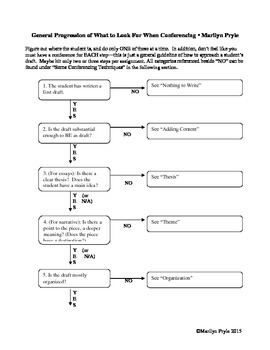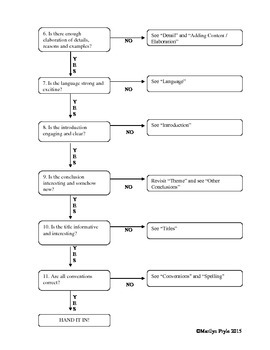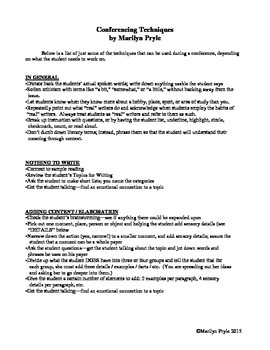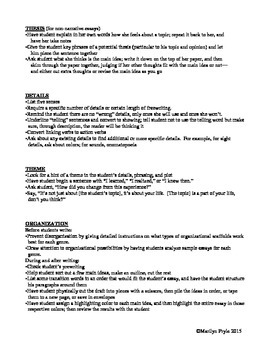75+ Ideas of What to Say During a Writing Conference, and When to Say It!
Marilyn Pryle
55 Followers
Grade Levels
5th - 12th, Homeschool
Subjects
Resource Type
Standards
CCSSCCRA.W.1
CCSSCCRA.W.2
CCSSCCRA.W.3
CCSSCCRA.W.4
CCSSCCRA.W.5
Formats Included
- PDF
Pages
6 pages
Marilyn Pryle
55 Followers
Description
Do you sometimes wonder if you're giving students the most helpful advice at the right stage when you talk to them about their writing? Here, I have compiled a list of 79 thoughts, activities, and responses to give students during a writing conference. I have taught writing and writing workshop for over 20 years, and these are my most effective methods. In addition, I give a flow-chart of what to (generally) check for first, next, and so on when you see a student's draft. The flow chart has 11 steps (though not all need to be checked for every assignment) and each step recommends you to a corresponding area of advice. The areas of advice include:
GENERAL ADVICE
"I HAVE NOTHING TO WRITE"
ADDING CONTENT / ELABORATION
THESIS
DETAILS
THEME
ORGANIZATION
INTRODUCTION
CONCLUSIONS/CLINCHERS
LANGUAGE
TITLES
CONVENTIONS and SPELLING
REVISING POETRY
ENDING A POEM
Each area of advice has several suggestions below it from which to choose. This packet is perfect for use in a writing workshop or for the days you want to help your students with their drafts outside a workshop. It is a compilation of knowledge, experience, and trial and error from years and years of writing conferences!
GENERAL ADVICE
"I HAVE NOTHING TO WRITE"
ADDING CONTENT / ELABORATION
THESIS
DETAILS
THEME
ORGANIZATION
INTRODUCTION
CONCLUSIONS/CLINCHERS
LANGUAGE
TITLES
CONVENTIONS and SPELLING
REVISING POETRY
ENDING A POEM
Each area of advice has several suggestions below it from which to choose. This packet is perfect for use in a writing workshop or for the days you want to help your students with their drafts outside a workshop. It is a compilation of knowledge, experience, and trial and error from years and years of writing conferences!
Total Pages
6 pages
Answer Key
N/A
Teaching Duration
N/A
Report this resource to TPT
Reported resources will be reviewed by our team. Report this resource to let us know if this resource violates TPT’s content guidelines.
Standards
to see state-specific standards (only available in the US).
CCSSCCRA.W.1
Write arguments to support claims in an analysis of substantive topics or texts, using valid reasoning and relevant and sufficient evidence.
CCSSCCRA.W.2
Write informative/explanatory texts to examine and convey complex ideas and information clearly and accurately through the effective selection, organization, and analysis of content.
CCSSCCRA.W.3
Write narratives to develop real or imagined experiences or events using effective technique, well-chosen details, and well-structured event sequences.
CCSSCCRA.W.4
Produce clear and coherent writing in which the development, organization, and style are appropriate to task, purpose, and audience.
CCSSCCRA.W.5
Develop and strengthen writing as needed by planning, revising, editing, rewriting, or trying a new approach.





